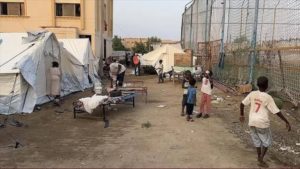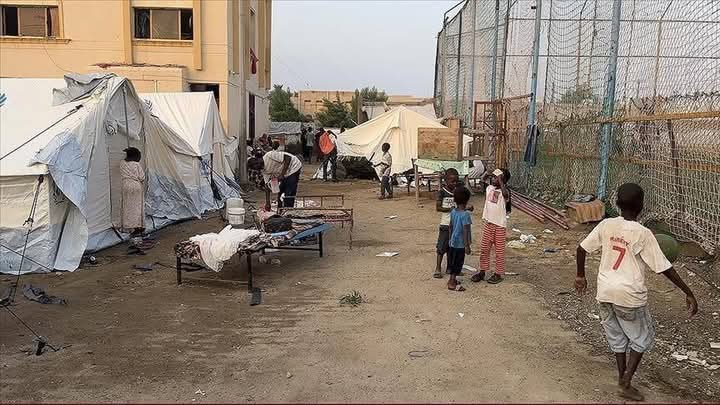
By Adeyemi Adekunle
In the dusty streets of Tokar, a town nestled in Sudan’s Red Sea state, 3-year-old Amara clutches her mother’s fragile hands. Her belly is swollen, not from nourishment but from severe acute malnutrition—a devastating condition threatening the lives of 772,000 children across Sudan.
As the conflict between the Sudanese army and the paramilitary Rapid Support Forces (RSF) rages on, the smallest voices are drowning in silence, unheard amidst the sound of gunfire and political disputes.
A Catastrophe in Numbers
According to UNICEF, a staggering 3.2 million children under five are projected to face acute malnutrition this year. Of those, nearly 25% risk death from starvation without immediate intervention.
The scale of the crisis is underscored by a United Nations-backed report indicating famine already gripping five areas, with warnings of further expansion if current trends persist. Entire communities are left teetering on the edge of collapse in western Darfur and other conflict-ridden regions.
“Sudan is a hunger zone,” says Eva Hinds, UNICEF Sudan’s Head of Advocacy and Communication. “The conflict exacerbates what was already a dire humanitarian situation.” More than 24.6 million people—half of Sudan’s population—now grapple with acute food insecurity.
The Children Left to Starve
In a Port Sudan clinic overcrowded with weary mothers cradling skeletal infants, Dr. Safia Younis has seen the toll firsthand. “Severe acute malnutrition isn’t just a number. It’s children whose rib cages you can count.
Their skin loses elasticity; even their cries become weaker. Their little bodies are shutting down,” she laments, wiping tears away between hurried consultations.
Among the sea of sufferers is Adam, a two-year-old boy whose cheeks have sunken and limbs have thinned beyond recognition. His father, Abbas, walked for three days through dangerous territory to reach the clinic, hoping to secure the Plumpy’Nut supplements that could save his son.
“This war has stolen everything from us—our home, our cattle, even the chance for my child to grow,” Abbas says, his voice trembling with exhaustion.
Starvation as a Weapon of War
Experts believe the crisis is exacerbated by deliberate “starvation tactics.” A United Nations panel accused both warring factions of using food insecurity as a tool to break communities and weaken enemy morale.
Blockades on humanitarian aid, relentless violence, and bureaucratic roadblocks have left aid agencies paralyzed.
“The Rapid Support Forces and the army are fighting on the backs of civilians,” says Osman Hamdi, a former government official turned refugee. “Hunger has become part of their arsenal, and we are the casualties.”
In October, famine-stricken Darfur became a tragic symbol of these tactics, where access to clean water, arable land, and food supplies has been systematically obstructed.
A humanitarian worker in western Sudan recalls the chilling sight of villages burned to ash, their food stores looted, and livestock slaughtered. “This isn’t collateral damage—it’s targeted destruction,” she says.
Global Condemnation, Local Despair
International attention has recently turned toward Sudan’s crisis, with the United States declaring that the RSF committed genocide and imposing sanctions on its leader. Yet the response has been slow, and tangible aid even slower.
Access to afflicted areas remains restricted by conflict zones and bureaucratic entanglements, preventing aid workers from reaching those most in need.
“The lack of unhindered humanitarian access makes it nearly impossible to save lives at the scale required,” Hinds warns, emphasizing that immediate action is needed to halt the famine’s spread. Unfortunately, such access feels like an unattainable luxury in a nation fractured by 20 months of relentless warfare.
The Plight of Displacement
The crisis is not contained within static borders. More than 12 million Sudanese people have fled their homes, marking the largest displacement crisis in the world. Refugees like Widad and her four children find themselves stranded in makeshift camps with no clean water, sanitation, or regular food supplies.
“We eat once every two days if we are lucky,” Widad explains, her eyes dull with resignation. “Sometimes we feed the youngest ones and go hungry ourselves.”
Across these camps, disease ravages the already weakened population. Cholera, measles, and malaria spread unchecked, preying on malnourished bodies with lethal efficiency.
Doctors Without Borders reports treating children too malnourished for vaccinations, only for them to succumb to preventable diseases days later.
Hope Amid the Ashes
Despite the bleakness, sparks of hope flicker in unexpected places. Grassroots organizations and international aid groups are deploying whatever resources they can to provide emergency relief. Community kitchens run by local women in Darfur distribute food to families daily, using their dwindling supplies to nurture their neighborhoods.
Global donations, though insufficient, have allowed UNICEF to set up malnutrition treatment centers in urban strongholds like Port Sudan. There, mothers like Farida sit through grueling heat, waiting their turn for their children to be evaluated and treated. “The road ahead is long,” says Farida, clutching her six-month-old daughter. “But as long as she’s breathing, I won’t stop trying.”
A Cry for Ceasefire
Across Sudan, one sentiment resonates louder than all others: only peace can save the nation. Without a ceasefire, even the most heroic humanitarian efforts will struggle to break the cycle of starvation. Experts warn that the conflict is not only sustaining the crisis but actively fueling it.
A recent UN report ominously predicted that the famine’s reach could expand to five more regions by May if urgent action is not taken. “The first thing Sudan needs is an end to this war,” emphasizes Hinds. “Only then can we rebuild.”
The malnutrition crisis in Sudan is not merely a tragedy; it is a human rights emergency demanding an urgent global response.
Behind every statistic lies a face, a name, and a story of unimaginable hardship. As the world watches, the question remains: will it act, or will more innocent lives be lost to this man-made disaster?




